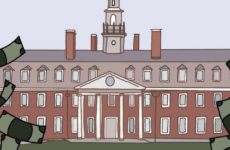Last term, I opted to take Women’s Studies because I wanted to understand more about the female experience — one that I, as a male, will never fully comprehend. My plan was to voice my thoughts occasionally; I was there to listen.
 I went into the course worried about the intellectually and emotionally difficult material we would soon tackle. With a class of so many differing perspectives, I wondered where our discussions would lead.
I went into the course worried about the intellectually and emotionally difficult material we would soon tackle. With a class of so many differing perspectives, I wondered where our discussions would lead.
My fears quickly subsided — from the very first class, I knew I had found the environment for me. I’ve rarely felt more comfortable and more intellectually fulfilled than I did in that class. Not only was I allowed to speak, but my voice was eagerly sought out. It was okay that I didn’t know everything. Everyone acknowledged that my classmates and I, regardless of our respective perspectives, were all there simply to try to begin to understand.
Students at Choate are regularly asked to embrace the unknown — Women’s Studies serves as a perfect platform to do so. One of the first topics we covered identified the difference between gender and sex. Most people acknowledge that sex deals with a person’s biological or reproductive selves, while gender deals with one’s sexual characteristics based on social and cultural norms.
Beyond this, however, lies a belief that sex is a social construct because society has assigned various stereotypes to people based on their natural genitalia. This concept — the idea that something we think is natural is, in fact, a construct of society — was tough for me to grasp.
Admittedly, it still troubles me—but isn’t that the point? Every class left me questioning, wanting to understand. I’ve realized that Choate students need a space to grapple with issues beyond their comprehension. Furthermore, every student needs to learn that the thought — not the answer — is the most rewarding part of the process.
In truth, I never expected the material to be so relevant to my experience as a male. One of the first parts of our unit on rape culture examined sexual assault on college campuses. After we watched The Hunting Ground — a documentary about college administrations’ mishandling of sexual assault — my sense was that every student was floored, angered, and depleted. The realization that we may enter a similarly aggressive environment at college scared us all. I cannot recall another time in any of my classes here when every student reacted so strongly.
So here’s a thought: require all students to take Women’s Studies. Why? Because of the content, of course, but also because of the general ethos of the class. To teach it and to study it demands a community of trust and vulnerability. It also discomfits us in all the right ways.
Members of my class were willing to share personal stories that connected in-class material to their lives. This made discussions far more productive, relevant, and interesting. In the three months that we spent together, I got to know each of my classmates well. I know I wouldn’t have if the material had not been so powerful and so important.




